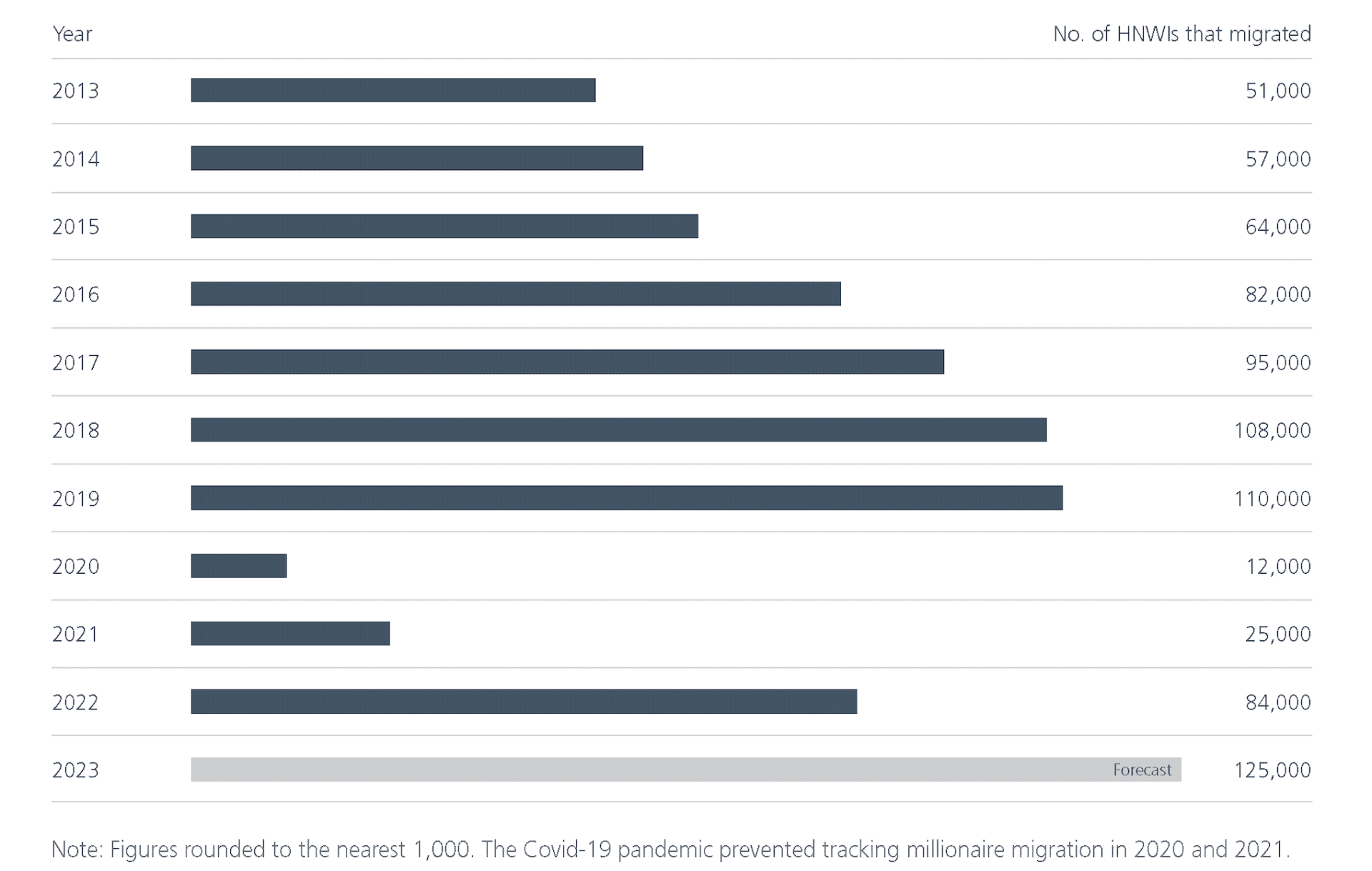Dr. Juerg Steffen is the Chief Executive Officer of Henley & Partners
The migration of affluent individuals and private wealth, whether via residence and citizenship by investment programs or otherwise, has regained traction following a hiatus of over two years due to the Covid‑19 pandemic. Whether they are high‑net‑worth individuals (with wealth of USD 1 million or more), centi-millionaires (with wealth of USD 100 million or more), or dollar billionaires, all are looking to protect their asset bases and enhance growth potential.
While many are already on the move, many more are reassessing where best to position themselves, their families, and their assets as a hedge against ongoing regional and global volatility. With a growing number of millionaires considering relocation to protect themselves and their families from political instability and economic turbulence, governments around the world — in a race to attract capital and talent to their shores — are increasing the range of available migration paths, including by introducing residence and citizenship by investment programs.

A myriad of factors motivates the wealthy to migrate but traditionally the main drivers have included the desire for a higher standard of living, increased opportunities for business diversification, better education options for their children, a more desirable climate or less polluted environment — and in recent years, higher climate resilience. The pandemic, socioeconomic upheavals and political instability across the globe, and conflict in vulnerable parts of the world as well as in Europe, have highlighted to many — and the wealthy population is no exception — the need to improve safety and security for their families, escape oppressive or corrupt regimes, access premium education and world-class healthcare, and enjoy more favorable tax environments
Figure 1. Millionaire migration since 2013

Sources: Henley Private Wealth Migration Dashboard (2022) and New World Wealth December 2022 data
The migration data for high-net-worth individuals in Figure 1 reflects the number of millionaires who have moved to a new country year on year since 2013 — namely, those who have relocated and remained in a new country for longer than six months. As Figure 1 illustrates, in the leadup to 2020, wealth migration had been steadily accelerating, with approximately 108,000 high‑net‑worth individuals migrating in 2018 compared to 95,000 in 2017, 82,000 in 2016, and 64,000 in 2015. However, the outbreak of the Covid-19 pandemic in late 2019 and the associated lockdown and travel restrictions that characterized 2020 and 2021 significantly impeded global mobility for all. The 2022 figure reveals a rapid recovery, and 2023 is projected to be a record‑breaking year, with the biggest millionaire migration in history, at 125,000.
During the height of the pandemic, many had no choice and experienced the discomfort of feeling trapped and having little control over their circumstances. Others who were fortunate to have optionality in terms of where they could reside, either through dual citizenship or permanent residence rights in other jurisdictions, enjoyed the freedom and benefits of having a Plan B or even a Plan C. It became crystal clear that your nationality, with its associated personal access rights and privileges, made a huge difference, resulting in a significant surge in interest in investment migration as a domicile diversification tool.
The curtailment of their mobility rights combined with unprecedented levels of volatility has seen ever‑growing numbers of high-net-worth individuals enquiring about residence and citizenship by investment programs in recent years, leading the sector to be worth an estimated EUR 20 billion.
An increasing outflow of millionaires is often a sign of a drop in confidence in a country, since high- and ultra‑high‑net-worth individuals have the means to leave and are thus usually the first to exit when circumstances change. Along with their families, millionaires also bring to their host countries their wealth and the taxes they pay. The loss of millionaires may be detrimental to the local economies and property markets of the countries they leave behind. In some cases, these individuals relocate their businesses — and the jobs the businesses generate — as well as their skills, qualifications, and influence. Therefore, while millionaires reflect only a small percentage of a country’s population, attracting, producing, and retaining them is an important endeavor for any country.
There is no doubt that the Covid-19 pandemic has accelerated the fierce competition among countries to draw wealth and talent. In this environment, some have been extremely innovative. The UAE, for example, has been immensely successful in enhancing its liveability and drawing the talented and the wealthy to its shores. This is in part due to its business-friendly policies and the UAE Residence by Investment Program, which further extended its eligibility criteria in 2022 in order to attract and retain wealth and top talent. With the world order upended — along with its production, distribution, energy, and finance systems — by Covid-19 and the war in Ukraine, and the next world order yet to be revealed, strategies of this sort might well prove vital for nation states to succeed.
Many of the world’s leading financial centers are in countries that host investment migration programs and actively encourage foreign direct investment in return for residence rights, such as the UK, the USA, Hong Kong (SAR China), Singapore, Switzerland, Luxembourg, and the UAE. The programs provide high‑net‑worth individuals with the option of physically relocating, if they wish, as well as the right to live, study, receive quality healthcare, and conduct business in their new country of residence. These countries offer excellent options for private residence, business opportunities, premium educational institutions, top private healthcare facilities, and a high quality of life.
Residence and citizenship by investment programs in sought-after countries such as Cyprus, Greece, Malta, Mauritius, Montenegro, Portugal, Spain, and the UAE and in the Caribbean offer attractive real estate options. International real estate has always been a reliable asset class, demonstrating decades‑long returns and enabling affluent individuals to protect and increase their wealth by diversifying their portfolios. Real estate-linked investment migration provides a unique opportunity to acquire two desirable assets — access to multiple jurisdictions and international real estate — in just one transaction. Investing in real estate to gain residence rights or citizenship of another country affords investors all the classic benefits of owning real estate, and more. Real estate is widely recognized as one of the most stable long-term investments, so investors are more than likely to break even and could turn a profit after just five years. Furthermore, owners can live in their properties, use them as vacation homes, or rent them out to create an additional income stream. A rental income in a strong currency such as the euro could look particularly attractive to an investor from a country with a weaker currency.
Just 20 years ago, investment migration may have been seen as something of an esoteric option reserved for the very wealthy, even deemed unpatriotic at times, but that is no longer the case. Many countries around the world now permit dual citizenship, and the concept has gained significant traction over the past decade. Moreover, today it is a buyers’ market, with many governments restarting, refining, and/or developing new investment migration options in the wake of Covid-19 as a means of generating debt-free liquidity. In the past few years, investment migration has moved to being a mainstream wealth planning product as increasing numbers of investors utilize residence and citizenship by investment programs to access previously restricted opportunities across the globe and protect their wealth and legacies.
Dr. Juerg Steffen, FIMC, is the Chief Executive Officer of Henley & Partners. He has more than 30 years’ experience in the financial services industry and is widely regarded as a leader in the field of investment migration. After joining Henley & Partners in 2013 to set up its Singapore office, Dr. Steffen went on to establish the firm as a key player in what is now a significant region for inbound and outbound investment migration. Later appointed Chief Operating Officer of the group, he has played a pivotal role in growing the investment migration sector and Henley & Partners, improving the firm’s operational standing, and developing crucial structures and processes that enable it to keep the leading position it has always held.
Before joining Henley & Partners, Dr. Steffen was a personal advisor in the family office of one of Europe’s wealthiest families. He also served as a member of the management board and as head of the Wealth Planning department of a leading private bank in Austria and was a director in the Cross‑Border Wealth Planning department of UBS in Zurich, advising high-net‑worth individuals and key clients in complex matters regarding financial, tax, succession, and residence and citizenship planning. Dr. Steffen also developed and established a private bank operation for one of Switzerland’s foremost banks and is the editor of definitive books on high‑net‑worth relocation to Austria and Switzerland.